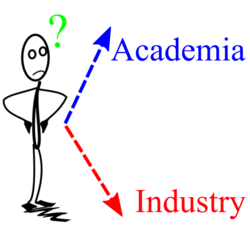Blog: Education
-
Cognitive biases
in: Education, Popular Science, Researchon July 2, 2018You certainly know drawings like those shown below. They are optical illusions, and are designed to deceive our visual perception. Multiple forms of illusions exist. Exact categorization on an objective level is difficult, however, because the illusions result from a combination of physical properties of the stimuli, physiologic characteristics of visual perception, and, most importantly, traits of the cognitive system as a whole.
more -
Crack a presentation 101
After some time in academia you realize that getting people to understand your research is as important as the scientific methodology you have used. And this is even more true when you are trying to secure funding for your future research. There are many ways in which you can convey your message, through journal publications, reports and presentations.
more -
Life management – Part 2
To be successful in managing/leading a family or a team, a very important thing is to be able to talk things out properly – problems, wishes or simply emotions. So here I go, and share some of the situations from home which allow me to develop stronger communication skills.
more -
Selling stories 2
In my last blog post, I wrote about the issue of fitting a selection of scientific observations into seemingly plausible stories concluding that it is better to focus on data/content rather than the story. Now I want to pick up that story selling theme, but explore it from a different perspective. I start with challenging my own viewpoint by claiming: We need more stories in science! Yes, this reads like a blatant contradiction, but it is not, as I will make clear in a moment.
more -
Are you up to the challenge?
Recently I came across some blogs where people were asking for suggestions on what to do at the end of their PhD studies. Besides the evergreen question about moving to industry or not, another dilemma was whether to stay in one’s current research field for a post-doctoral appointment (you can find an interesting article here). I thought I would share my experience as a (freshly) graduated PhD student in this blog.
more -
Whether to stay in academia or leave it, that is the question.
The challenging question arises right after or few months before PhD graduation: whether to stay in academia or leave it for an industrial career. The answer obviously depends on the personal attitude and the opportunities available at the time. However, as a PhD student you have to foresee certain points in order to make an appropriate career decision.
more -
Capillary effects: from garden to lab applications
As part of a project-based course, we are initiating students to micro-fluidic devices for medical diagnostics. The underlying principle is to automatize a diagnostic procedure typically done in a specialized laboratory and bring it to the point-of-care. Beyond automation, miniaturization offers a number of advantages including low fluid volumes (implying smaller patient sample, less waste and lower reagent costs), faster analysis and potential for highly compact systems, all of which make these so called “lab-on-a-chip” approaches ideal candidates for the development of point-of-care diagnostic devices.
more -
Life management – Part 1
After a timeout with my family for a year, I am happy to have the opportunity to work as a scientific lab manager again. Here I’m going to share some of my experiences I take from home to be more efficient at work.
more -
What children bring to science
A 6-year old looking at the sea, following the trajectories of a jet ski and ocean liner:
“Why, in case of a collision, can it not be the jet ski that wins??”
Bright and clear: Momentum, energy. You enthusiastically translate the scene into a series of equations, 15 minutes of monologue, excitation, gestures, before concluding with a pinch of emotion in your voice, your arm pointed towards the horizon “Quod erat demonstrandum!”.
more








